-
 Bitcoin
Bitcoin $91,256.3033
3.39% -
 Ethereum
Ethereum $1,723.5244
5.98% -
 Tether USDt
Tether USDt $1.0006
0.10% -
 XRP
XRP $2.1808
2.69% -
 BNB
BNB $611.6352
1.26% -
 Solana
Solana $145.2440
4.71% -
 USDC
USDC $1.0001
0.07% -
 Dogecoin
Dogecoin $0.1726
6.92% -
 TRON
TRON $0.2472
1.71% -
 Cardano
Cardano $0.6638
3.44% -
 Chainlink
Chainlink $14.0337
4.16% -
 Avalanche
Avalanche $21.8740
6.44% -
 UNUS SED LEO
UNUS SED LEO $8.9676
-1.35% -
 Stellar
Stellar $0.2598
-0.15% -
 Sui
Sui $2.4368
8.47% -
 Shiba Inu
Shiba Inu $0.0...01309
4.18% -
 Hedera
Hedera $0.1782
3.94% -
 Toncoin
Toncoin $2.9908
-0.39% -
 Bitcoin Cash
Bitcoin Cash $361.0314
4.64% -
 Hyperliquid
Hyperliquid $18.8127
3.63% -
 Litecoin
Litecoin $82.7354
3.19% -
 Polkadot
Polkadot $3.9250
0.37% -
 Dai
Dai $1.0001
0.03% -
 Bitget Token
Bitget Token $4.5168
0.88% -
 Ethena USDe
Ethena USDe $0.9994
0.01% -
 Pi
Pi $0.6419
0.67% -
 Monero
Monero $219.7573
2.35% -
 Pepe
Pepe $0.0...08517
7.03% -
 Uniswap
Uniswap $5.6768
4.46% -
 Aptos
Aptos $5.1717
0.94%
What is a consensus mechanism? What is the main difference between PoW and PoS?
Consensus mechanisms like PoW and PoS are crucial for blockchain security and decentralization, each with unique energy and participation implications.
Apr 12, 2025 at 09:49 am
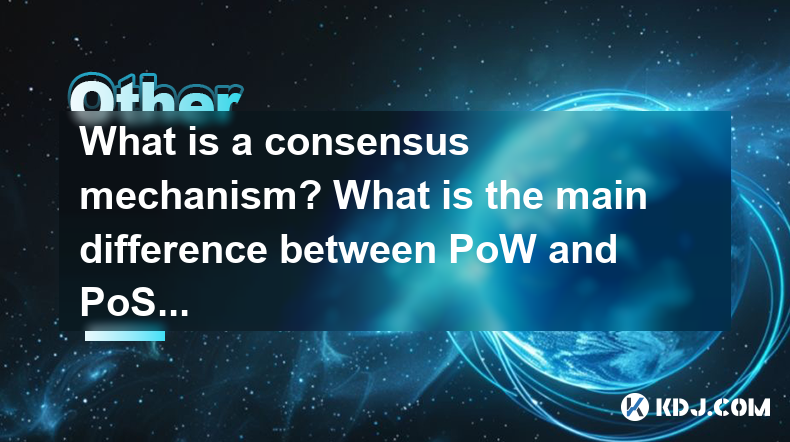
A consensus mechanism is a fundamental component of blockchain technology that enables decentralized networks to agree on the state of the shared ledger. It is the process by which all participants in a network reach a common agreement about the validity of transactions and the overall state of the blockchain. This mechanism ensures that the network remains secure and that no single entity can control the entire system. Without a consensus mechanism, it would be impossible to maintain trust and integrity in a decentralized environment.
Types of Consensus Mechanisms
There are various types of consensus mechanisms used in different blockchain networks, each with its own set of rules and methodologies. Some of the most common types include Proof of Work (PoW), Proof of Stake (PoS), Delegated Proof of Stake (DPoS), and Proof of Authority (PoA). Each type has its own advantages and disadvantages, and the choice of consensus mechanism depends on the specific needs and goals of the blockchain network.
Proof of Work (PoW)
Proof of Work is the original consensus mechanism used by Bitcoin and several other cryptocurrencies. In PoW, miners compete to solve complex mathematical puzzles to validate transactions and add new blocks to the blockchain. The first miner to solve the puzzle gets to add the block and is rewarded with newly minted cryptocurrency and transaction fees. This process requires significant computational power and energy, making it resource-intensive.
The main advantage of PoW is its security. Because solving the puzzles requires substantial computational effort, it is extremely difficult for a malicious actor to take control of the network. However, the downside is that PoW is energy-intensive and can lead to centralization, as only those with the resources to afford powerful mining hardware can participate effectively.
Proof of Stake (PoS)
Proof of Stake is an alternative consensus mechanism that aims to address some of the shortcomings of PoW. In PoS, validators are chosen to create new blocks based on the number of coins they hold and are willing to "stake" as collateral. The more coins a validator stakes, the higher their chances of being selected to validate transactions and add new blocks. This method is less energy-intensive than PoW because it does not require solving complex puzzles.
The primary advantage of PoS is its energy efficiency. It does not require the same level of computational power as PoW, making it more environmentally friendly. Additionally, PoS can be more decentralized because it allows a broader range of participants to validate transactions without the need for expensive mining equipment. However, PoS can be vulnerable to centralization if a small number of participants hold a large portion of the total stake.
Main Difference Between PoW and PoS
The main difference between Proof of Work and Proof of Stake lies in the method used to validate transactions and add new blocks to the blockchain. PoW relies on miners solving complex mathematical puzzles, which requires significant computational power and energy. In contrast, PoS relies on validators staking their cryptocurrency to participate in the validation process, which is less energy-intensive.
Another key difference is the security model. PoW's security is based on the difficulty of solving the puzzles, making it resistant to attacks but resource-intensive. PoS, on the other hand, relies on the economic incentives of staking, where validators risk losing their staked coins if they act maliciously. This makes PoS more energy-efficient but potentially more vulnerable to certain types of attacks if not properly designed.
Other Considerations
When choosing between PoW and PoS, it is important to consider the specific goals and requirements of the blockchain network. PoW may be preferred for networks that prioritize security and resistance to attacks, despite the higher energy costs. PoS, on the other hand, may be more suitable for networks that prioritize energy efficiency and broader participation.
Additionally, the scalability of the network is an important factor. PoW can be slower and less scalable due to the time required to solve puzzles, whereas PoS can be faster and more scalable because it does not have the same computational overhead. However, the actual performance of each mechanism can vary depending on the specific implementation and network design.
Implementation Challenges
Implementing a consensus mechanism, whether PoW or PoS, comes with its own set of challenges. For PoW, one of the main challenges is managing the difficulty level of the puzzles. If the difficulty is too low, the network can be vulnerable to attacks; if it's too high, it can become too centralized. For PoS, a major challenge is preventing centralization and ensuring that the staking process remains fair and accessible to all participants.
Another challenge is forking, which can occur when different parts of the network disagree on the state of the blockchain. This can lead to the creation of multiple versions of the blockchain, which can undermine the integrity of the network. Both PoW and PoS have mechanisms to deal with forks, but the effectiveness of these mechanisms can vary.
Frequently Asked Questions
Q: Can a blockchain use both PoW and PoS?
A: Yes, some blockchains use a hybrid model that combines elements of both PoW and PoS. For example, a blockchain might use PoW for initial block creation and then switch to PoS for subsequent validation. This approach aims to leverage the security of PoW and the energy efficiency of PoS.
Q: How does the choice of consensus mechanism affect transaction fees?
A: The choice of consensus mechanism can significantly impact transaction fees. In PoW, miners are rewarded with both newly minted coins and transaction fees, which can lead to higher fees during times of high network congestion. In PoS, validators are typically rewarded with transaction fees alone, which can lead to lower fees if the network is designed to prioritize efficiency.
Q: Are there other consensus mechanisms besides PoW and PoS?
A: Yes, there are several other consensus mechanisms, including Delegated Proof of Stake (DPoS), Proof of Authority (PoA), Proof of Capacity (PoC), and Proof of Burn (PoB). Each of these mechanisms has its own unique approach to achieving consensus and may be more suitable for certain types of blockchain networks.
Q: How do consensus mechanisms impact the decentralization of a blockchain?
A: Consensus mechanisms play a crucial role in the decentralization of a blockchain. PoW can lead to centralization if only a few large mining pools control the majority of the network's computational power. PoS can also lead to centralization if a small number of participants hold a large portion of the total stake. The design of the consensus mechanism must carefully balance security, efficiency, and decentralization to maintain the integrity of the blockchain.
Disclaimer:info@kdj.com
The information provided is not trading advice. kdj.com does not assume any responsibility for any investments made based on the information provided in this article. Cryptocurrencies are highly volatile and it is highly recommended that you invest with caution after thorough research!
If you believe that the content used on this website infringes your copyright, please contact us immediately (info@kdj.com) and we will delete it promptly.
- Launch of The Echo exchange and its native token, ECHO
- 2025-04-22 23:00:11
- 1933 penny coin could be worth a life-changing sum of money
- 2025-04-22 23:00:11
- ArchVM Launches a Test Version of Its Bitcoin Virtual Machine, Raising $10M in Funding
- 2025-04-22 22:55:13
- Both gold and Bitcoin (BTC) have extended their gains since yesterday
- 2025-04-22 22:55:13
- Mantra (OM) token crash requires a detailed forensic study, not just basic blockchain analysis
- 2025-04-22 22:50:11
- US Bitcoin (BTC) Exchange-Traded Funds (ETFs) Experience Their Largest Single-Day Net Inflow
- 2025-04-22 22:50:11
Related knowledge
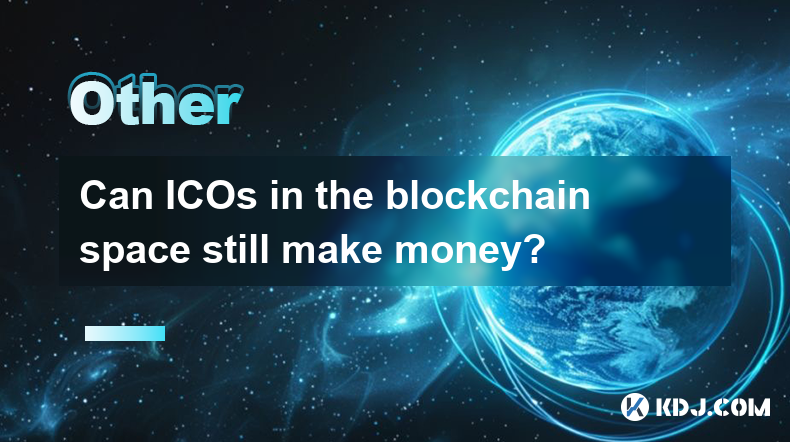
Can ICOs in the blockchain space still make money?
Apr 17,2025 at 08:29pm
The landscape of Initial Coin Offerings (ICOs) in the blockchain space has evolved significantly since their peak in 2017 and 2018. Despite the increased regulatory scrutiny and the rise of alternative fundraising methods like Security Token Offerings (STOs) and Initial Exchange Offerings (IEOs), ICOs can still be a viable way to raise funds and generat...
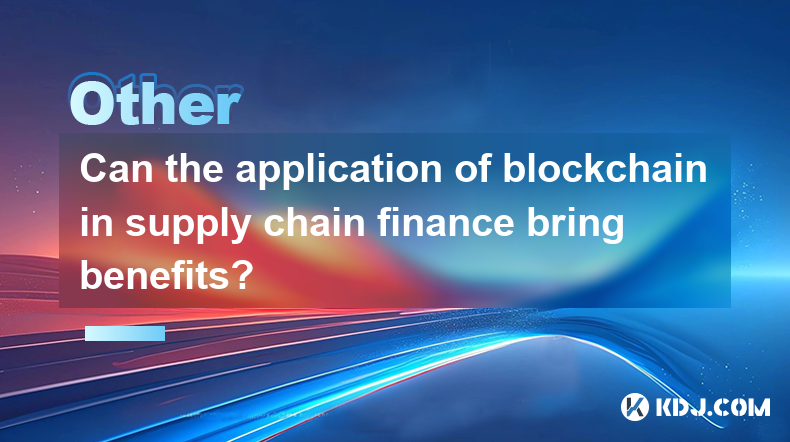
Can the application of blockchain in supply chain finance bring benefits?
Apr 15,2025 at 04:00pm
Can the application of blockchain in supply chain finance bring benefits? The integration of blockchain technology into supply chain finance has garnered significant attention in the cryptocurrency and financial sectors. This article explores how blockchain can potentially revolutionize supply chain finance, detailing its benefits and providing a compre...

Does the ranking of Chinese blockchain apps include cross-chain applications?
Apr 14,2025 at 04:00pm
The ranking of Chinese blockchain apps is a comprehensive evaluation that takes into account various aspects such as user base, transaction volume, and technological innovation. A pertinent question arises regarding whether these rankings include cross-chain applications. Cross-chain applications, which allow different blockchain networks to interact an...
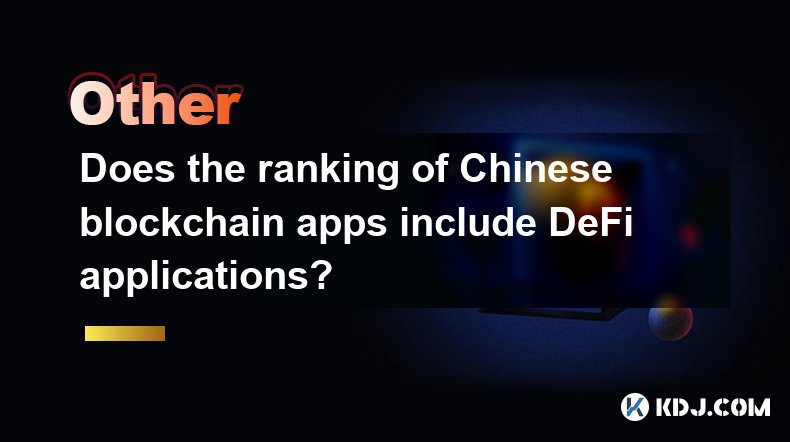
Does the ranking of Chinese blockchain apps include DeFi applications?
Apr 15,2025 at 06:57am
The ranking of Chinese blockchain apps is a comprehensive list that showcases the most popular and influential applications within the cryptocurrency ecosystem. One question that often arises is whether these rankings include DeFi applications. To answer this, we need to delve into the specifics of how these rankings are compiled and what types of appli...
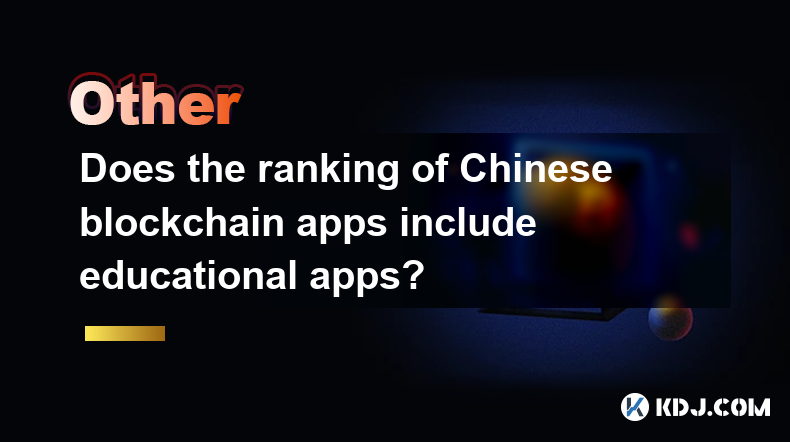
Does the ranking of Chinese blockchain apps include educational apps?
Apr 16,2025 at 03:35am
The ranking of Chinese blockchain apps often includes a variety of categories, from finance and gaming to social networking and beyond. One question that frequently arises is whether these rankings include educational apps. To address this, we need to delve into the specifics of how blockchain apps are categorized and ranked in China, and whether educat...
Does the ranking of Chinese blockchain apps include enterprise-level applications?
Apr 15,2025 at 06:42am
The ranking of Chinese blockchain apps often includes a variety of applications, ranging from consumer-focused to enterprise-level solutions. Understanding the scope and criteria for these rankings is essential to determine if enterprise-level applications are included. This article delves into the specifics of how Chinese blockchain app rankings are co...

Can ICOs in the blockchain space still make money?
Apr 17,2025 at 08:29pm
The landscape of Initial Coin Offerings (ICOs) in the blockchain space has evolved significantly since their peak in 2017 and 2018. Despite the increased regulatory scrutiny and the rise of alternative fundraising methods like Security Token Offerings (STOs) and Initial Exchange Offerings (IEOs), ICOs can still be a viable way to raise funds and generat...

Can the application of blockchain in supply chain finance bring benefits?
Apr 15,2025 at 04:00pm
Can the application of blockchain in supply chain finance bring benefits? The integration of blockchain technology into supply chain finance has garnered significant attention in the cryptocurrency and financial sectors. This article explores how blockchain can potentially revolutionize supply chain finance, detailing its benefits and providing a compre...

Does the ranking of Chinese blockchain apps include cross-chain applications?
Apr 14,2025 at 04:00pm
The ranking of Chinese blockchain apps is a comprehensive evaluation that takes into account various aspects such as user base, transaction volume, and technological innovation. A pertinent question arises regarding whether these rankings include cross-chain applications. Cross-chain applications, which allow different blockchain networks to interact an...

Does the ranking of Chinese blockchain apps include DeFi applications?
Apr 15,2025 at 06:57am
The ranking of Chinese blockchain apps is a comprehensive list that showcases the most popular and influential applications within the cryptocurrency ecosystem. One question that often arises is whether these rankings include DeFi applications. To answer this, we need to delve into the specifics of how these rankings are compiled and what types of appli...

Does the ranking of Chinese blockchain apps include educational apps?
Apr 16,2025 at 03:35am
The ranking of Chinese blockchain apps often includes a variety of categories, from finance and gaming to social networking and beyond. One question that frequently arises is whether these rankings include educational apps. To address this, we need to delve into the specifics of how blockchain apps are categorized and ranked in China, and whether educat...

Does the ranking of Chinese blockchain apps include enterprise-level applications?
Apr 15,2025 at 06:42am
The ranking of Chinese blockchain apps often includes a variety of applications, ranging from consumer-focused to enterprise-level solutions. Understanding the scope and criteria for these rankings is essential to determine if enterprise-level applications are included. This article delves into the specifics of how Chinese blockchain app rankings are co...
See all articles























































































